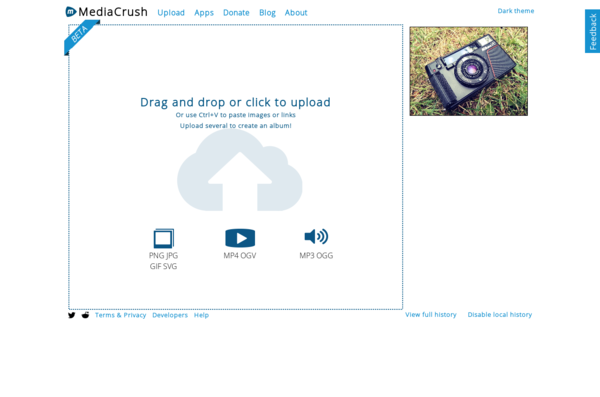MediaCrush: Open Source Image Hosting for Privacy-Conscious Users

Productivity Sauce
Next time you need to share a photo, an animated GIF, or an audio file, consider using MediaCrush. Why? Because this media hosting service is not only based on open source software, it also goes to great lengths to protect your privacy. MediaCrush uses https by default, it respects the Do Not Track settings, and it even allows you to turn off ads. The service doesn't store any history on its servers either; Instead, the history is saved locally in your browser. The only thing the service stores is your hashed IP address when you upload a file. This enables MediaCrush to identify malicious users and prevent them from uploading. MediaCrush is also transparent about its revenues, expenses, and statistics, and monthly reports are available for your perusal.
Privacy and transparency is only a part of MediaCrush's appeal. The service lets you upload and manage your media files with consummate ease. Uploading media to MediaCrush is as easy as dropping files from your machine onto the upload area of the service's web interface. When uploading multiple files, you are also given an option to create an album. For each hosted media file, MediaCrush conveniently generates links which let you embed, share, and download the file. MediaCrush stores the history locally, and you can view a list of uploaded files by pointing your browser to https://mediacru.sh/mine. There is also the MediaCrush shell script which can be used to upload files to MediaCrush from the command line. MediaCrush's source code is available on GitHub along with instructions on how to deploy the application on your own server.
comments powered by DisqusSubscribe to our Linux Newsletters
Find Linux and Open Source Jobs
Subscribe to our ADMIN Newsletters
Support Our Work
Linux Magazine content is made possible with support from readers like you. Please consider contributing when you’ve found an article to be beneficial.

News
-
Parrot OS Switches to KDE Plasma Desktop
Yet another distro is making the move to the KDE Plasma desktop.
-
TUXEDO Announces Gemini 17
TUXEDO Computers has released the fourth generation of its Gemini laptop with plenty of updates.
-
Two New Distros Adopt Enlightenment
MX Moksha and AV Linux 25 join ranks with Bodhi Linux and embrace the Enlightenment desktop.
-
Solus Linux 4.8 Removes Python 2
Solus Linux 4.8 has been released with the latest Linux kernel, updated desktops, and a key removal.
-
Zorin OS 18 Hits over a Million Downloads
If you doubt Linux isn't gaining popularity, you only have to look at Zorin OS's download numbers.
-
TUXEDO Computers Scraps Snapdragon X1E-Based Laptop
Due to issues with a Snapdragon CPU, TUXEDO Computers has cancelled its plans to release a laptop based on this elite hardware.
-
Debian Unleashes Debian Libre Live
Debian Libre Live keeps your machine free of proprietary software.
-
Valve Announces Pending Release of Steam Machine
Shout it to the heavens: Steam Machine, powered by Linux, is set to arrive in 2026.
-
Happy Birthday, ADMIN Magazine!
ADMIN is celebrating its 15th anniversary with issue #90.
-
Another Linux Malware Discovered
Russian hackers use Hyper-V to hide malware within Linux virtual machines.

